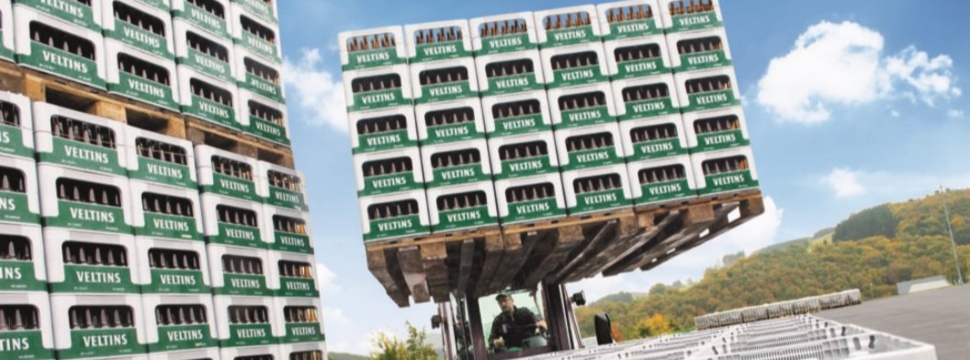Rapid growth in bottled beer at Veltins can absorb historic loss of draught beer
News General news
- Output shrinks moderately to 2.94 million hl
- New Pülleken pleases with strong demand
- Traditional company announces recruitment

With rapid growth in bottled beer, Brauerei C. & A. Veltins, Meschede-Grevenstein, Germany, has succeeded in cushioning the historic loss in its keg beer business. With a loss of volume due to the pandemic, the traditional company achieved a total output of 2.94 million hl (-3.5%) and sales of 342 million euros (-4.7%). "We are operating in calm waters despite the beer market turbulence and see ponderable market risks in the near future," said Veltins general manager Michael Huber. "Already in the summer of 2021, we expect a strong outdoor season in terms of sales, as people take back their normality of life in the beer garden and at home. The middle of the year can already bring a noticeable turnaround with the pandemic leveling off." Although the restaurant trade has been hit by the crisis, in many places it is showing staying power and a committed will to get going. In the brewing industry, says Huber, confidence is called for. The C. & A. Veltins brewery announced that it would be hiring more than a dozen new employees and continuing its multi-million investment program undaunted.
Private brewery performs better than the competition
Against all odds, the private brewery was able to consolidate its total output of 2.94 million hl, well above the competitive level. According to an initial forecast, the entire beer market will shrink by -6% in 2020 and thus by around 5.5 million hl - the biggest loss in volume since the currency reform. According to company estimates, Germany's catering industry lost total sales of 5.4 billion euros last year as a result of lower sales of draft beer. In 2020, the operating business of the C. & A. Veltins brewery was primarily determined by changes in consumer demand. While bottled beer output increased by 7.3% in the past fiscal year, the gastronomy-oriented keg beer business suffered a historic slump in sales of 56.3%. This was consumers' 2020 response to the area-wide loss of going-out opportunities and caused a precipitous shift in keg demand. "With the two lockdowns, keg beer sales suffered a full stop for weeks," said Dr. Volker Kuhl, managing director of marketing/sales. "The restaurant industry inevitably operated in crisis mode throughout - we suffered along with it." Consumers had to reorient themselves and, after only a short period of restraint, returned to enjoying beer within their own four walls and on the hot terrace. In the national premium comparison, the Veltins brand remained in third place. Veltins Pilsener in refillable bottles even grew by 8.6% in the largest and most fiercely contested variety segment of the German beer market. Dr. Volker Kuhl: "Especially in times of crisis, strong brands unleash their demand power on consumers because they stand for trust and confidence in unpredictable times." The Veltins non-refillable segment, with an output of 192,200 hl, grew only slightly.
Pülleken fulfills desire for carefree beer enjoyment
In the approximately 14,000 catering establishments, the C. & A. Veltins brewery lost 56.3% of its output in the keg beer business due to operational regulations, resulting in a keg beer volume of 228,400 hl at the end of the year. Despite the momentous impact of the pandemic in the catering business, the privately owned brewery leaves no doubt that it will continue its traditional course with commitment. Alongside the Veltins brand, the Grevensteiner brand underscored its importance as a firm constant in the highly competitive specialty segment. The trio of Original Landbier, Hellem, and Natur-Radler contributed a total of 244,500 (+1.3%) to overall sales, completely offsetting the company's own keg beer losses. Moreover, the Fassbrause portfolio of varieties actually grew by 48.7%, benefiting from increased demand from households at home. While the beer mix quintet V+ achieved 285,800 hl, the new launch of the pale Pülleken proved to be a stroke of luck, contributing 44,400 hl to the overall result. Dr. Volker Kuhl: "We were in the right place at the right time in the summer of 2020 and, with the Pülleken, met the consumer demand for carefree beer enjoyment." From the outset, the mild, drinkable pale in the 0.33-liter bottle with the familiar Euro look stood for fun, quaffable beer enjoyment - a welcome product response for consumers as a contrast to everyday life.
Second half of 2021 brings first relief
Notwithstanding the recent, already historic market slump, the traditional brewery has achieved growth of 24.6% since the turn of the millennium and consolidated at the solid output level of 2017 after the pandemic year. The company's market dynamics over the past decade are thus proving to be a guarantee that it will be able to cope well even with a loss of volume. According to Veltins' assessment, looking ahead already promises good chances of a visible market easing in the medium term. "We assume that we will slowly return to normality in the beer gardens in the summer, because people want to leave the restrictions behind," says Veltins general manager Michael Huber. Contrary to many questionable forecasts, the C. & A. Veltins brewery assumes that consumption and enjoyment behavior will relax quite quickly. If everything goes according to expectations, events can be expected again in the second half of the year. Nevertheless, it will take at least 30 months after the end of the pandemic to put the market imbalances behind us. It won't be until 2023 that the beer market will be back in full force.
Brewing industry suffers in parts threatening its existence
For the brewing industry, the entry into the new decade will remain momentous in the long term. Michael Huber: "It is already foreseeable that it will be economically difficult for many suppliers in the long term, and for some it will threaten their existence." Although the federal government has comprehensively ensured that the economically difficult situation has been cushioned with tax deferrals and compensatory measures for affiliated catering businesses, the effects of the erosion of earnings are not yet even apparent for family shareholders in many places. For many businesses, it became obvious how unstable their market position had become with dwindling liquidity. "Company closures will accompany us for the whole decade as a consequence of the pandemic," predicted the Veltins general manager.
"Staying on course with a steady hand in the crisis year"
The C. & A. Veltins brewery continues to rely on continuity. "Right now, we don't need doom and gloom, but entrepreneurial courage to prove our own confidence," said Michael Huber. Thus, he said, the workforce will still be increased by a dozen employees in 2021, so that by the end of the year the number of employees will reach more than 700. Since the turn of the millennium, the workforce at the C. & A. Veltins brewery has grown by around 200 people, an increase of around +34% (2020: 690 employees). The brewery is pushing ahead with its investments just as undauntedly. The new logistics warehouse with a total project volume of 30 million euros will go online in the spring, and the new bottling center is also under construction. It is also part of the multi-year investment offensive of 420 million euros, which will be completed in 2024.










